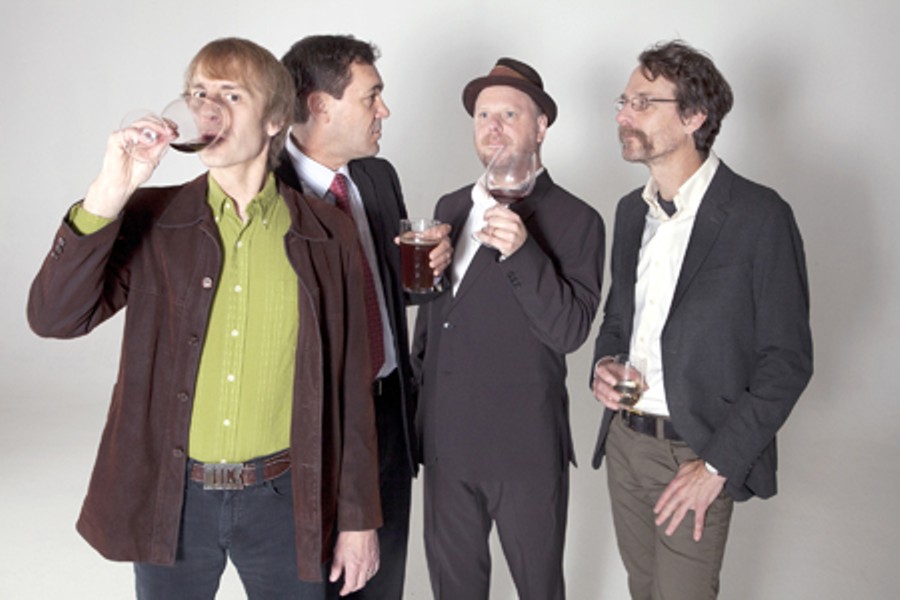At this juncture, it's likely that you've heard of Mudhoney, but it's less likely that you've actually heard the music. The Seattle-based quartet currently celebrating its 25th anniversary helped spark the grunge movement that overtook popular music in the '90s, serving as a key inspiration to bands like Nirvana. You can hear it in Mudhoney's early albums. Mark Arm's slurring howl on 1989's Mudhoney revels in the technique that Kurt Cobain filled with his own self-loathing sentiments.
But, in many ways, Mudhoney has always stood apart from its early grunge peers. The band's songs move quickly and vibrantly, boogying with caustic energy beneath burly fuzz.
They didn't — and don't — sound out-of-synch with that era, but Mudhoney's take on messy, muddled rock 'n' roll avoids the stereotyped hallmarks of grunge's most famous devotees, many of whom shared space with the band on Sub Pop Records, the eminent indie imprint that also turns 25 this year.
Mudhoney, who will perform in Charlotte for the first time at Tremont Music Hall on Sept. 25, is back on Sub Pop now, returning to the label in 2002 after a seven-year stint in the majors.
And the band is still making fast, loose and aggressively fun rock songs. Suffice it to say, Mudhoney's music won't fit the expectations of listeners who come to them by way of a Cobain biography.
"In a lot of people's minds, we are frozen in time from wherever they first heard us," asserts guitarist and founding member Steve Turner, "whether that be the initial underground grunge thing — you know, the Sub Pop in '89 kind of era — or when Nirvana hit big, and they discovered us when we signed to Reprise Records. You're always dealing with that. What's the term now? Heritage act? We're a heritage act. We have to acknowledge that. It's just the nature of people. I do it, too. But it's not like we have to conform to anything. We try to play the music that we play the best we can."
Mudhoney acknowledges the importance of its past works, but it's not burdened by them. 2013's Vanishing Point is lithe and heavy.
Its melted solos and feral hooks have more in common with today's most muscular psych-rock outfits — Virginia's Pontiak, for instance — than they do with the jutting brambles favored by old-school indie rock.
Turner's solos swagger and sway, indulging in disorienting distortion, but never allowing that to impede his touch for engaging melody. Arm's vocals are guttural but easygoing, conveying unabashed aggression and sarcastic humor, all within one breath.
The band members might have a quarter century in their rearview, and they might be best known for having had a hand in a genre with a cultural ubiquity that now rivals that of disco or New Wave. But on Vanishing Point, Mudhoney remains more relevant than you'd expect of any so-called "heritage act." The band is mindful of its history, and it still plays plenty of its old songs live, but its focus is on the here and now.
"It's just kind of what happens when we play together for the most part," Turner says. "We try to get outside of our comfort zone, but often we get outside of the comfort zone and we're really excited about being outside of the comfort zone. Then two years later, we realize that it's not really a good song, and we don't play it anymore. I don't think that we're trying to repeat ourselves or anything. [With] our influences, there's a lot of territory to mix and match from."
Mudhoney's still around, and its songs sound as vital as they ever have. But making music is not the band's primary pursuit. Vanishing Point is its first record in five years, the longest break of the band's career. It was signed to Reprise Records during the grunge boom, but none of its albums saw too much success.
There have been hiatuses and near break-ups, and with Turner now living in Portland, coordinating the group's activity can be a hassle.
They all have jobs outside of music, and three of them have kids at home. They tour when they can and write new songs here and there, but Mudhoney is a pursuit of passion, not obligation. Perhaps that's why they continue to thrive.
"I don't think we really feel much pressure from any outsiders at this point," Turner offers. "We will do whatever we want, and it's not going to change that much. But even little changes seem to offend some people. We do it for us, and we like doing it. We're really stoked that people are still interested in it because we have a lot of friends that do the exact same thing that we do, work a regular job and play music on the side, for shit money, getting very small crowds. I think we're very lucky at this point."
